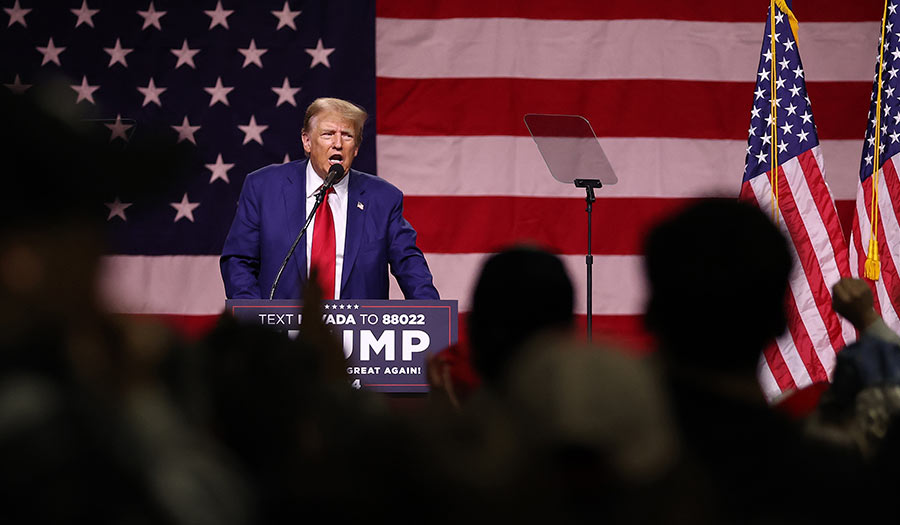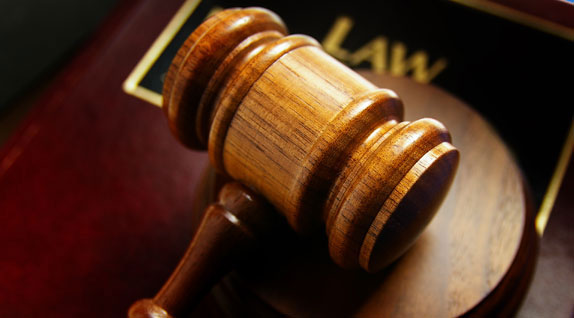 Justin Sullivan/Getty Images
Justin Sullivan/Getty Images
World News Desk
Learn the why behind the headlines.
Subscribe to the Real Truth for FREE news and analysis.
Subscribe NowDENVER (AP) – First, Colorado’s Supreme Court ruled that former President Donald Trump was not eligible to run for his old job in that state. Then, Maine’s Democratic secretary of state ruled the same for her state. Who’s next?
Both decisions are historic. The Colorado court was the first court to apply to a presidential candidate a rarely used constitutional ban against those who “engaged in insurrection.” Maine’s secretary of state was the first top election official to unilaterally strike a presidential candidate from the ballot under that provision.
But both decisions are on hold while the legal process plays out.
That means that Mr. Trump remains on the ballot in Colorado and Maine and that his political fate is now in the hands of the U.S. Supreme Court. The Maine ruling will likely never take effect on its own. Its central impact is increasing pressure on the nation’s highest court to say clearly: Can Mr. Trump still run for president after the January 6, 2021, attack on the U.S. Capitol?
What Is the Legal Issue?
After the Civil War, the U.S. ratified the 14th Amendment to guarantee rights to former slaves and more. It also included a two-sentence clause called Section 3, designed to keep former Confederates from regaining government power after the war.
The measure reads:
“No person shall be a Senator or Representative in Congress, or elector of President and Vice-President, or hold any office, civil or military, under the United States, or under any State, who, having previously taken an oath, as a member of Congress, or as an officer of the United States, or as a member of any State legislature, or as an executive or judicial officer of any State, to support the Constitution of the United States, shall have engaged in insurrection or rebellion against the same, or given aid or comfort to the enemies thereof. But Congress may by a vote of two-thirds of each House, remove such disability.”
Congress did remove that disability from most Confederates in 1872, and the provision fell into disuse. But it was rediscovered after January 6.
How Does This Apply to Mr. Trump?
Donald Trump is already being prosecuted for the attempt to overturn his 2020 loss that culminated with January 6, but Section 3 does not require a criminal conviction to take effect. Dozens of lawsuits have been filed to disqualify Mr. Trump, claiming he engaged in insurrection on January 6 and is no longer qualified to run for office.
All the suits failed until the Colorado ruling. And dozens of secretaries of state have been asked to remove him from the ballot. All said they did not have the authority to do so without a court order—until Maine Secretary of State Shenna Bellows’ decision.
The Supreme Court has never ruled on Section 3. It is likely to do so in considering appeals of the Colorado decision—the state Republican Party has already appealed, and Mr. Trump is expected to file his own shortly. Ms. Bellows’ ruling cannot be appealed straight to the U.S. Supreme Court—it has to be appealed up the judicial chain first, starting with a trial court in Maine.
The Maine decision does force the high court’s hand, though. It was already highly likely the justices would hear the Colorado case, but Maine removes any doubt.
Mr. Trump lost Colorado in 2020, and he does not need to win it again to garner an Electoral College majority next year. But he won one of Maine’s four Electoral College votes in 2020 by winning the state’s 2nd Congressional District, so Ms. Bellows’ decision would have a direct impact on his odds next November.
Until the high court rules, any state could adopt its own standard on whether Mr. Trump, or anyone else, can be on the ballot. That is the sort of legal chaos the court is supposed to prevent.
What Are the Arguments in the Case?
Mr. Trump’s lawyers have several arguments against the push to disqualify him. First, it is not clear Section 3 applies to the president—an early draft mentioned the office, but it was taken out, and the language “an officer of the United States” elsewhere in the Constitution does not mean the president, they contend.
Second, even if it does apply to the presidency, they say, this is a “political” question best decided by voters, not unelected judges. Third, if judges do want to get involved, the lawyers assert, they’re violating Mr. Trump’s rights to a fair legal procedure by flatly ruling he is ineligible without some sort of fact-finding process like a lengthy criminal trial. Fourth, they argue, January 6 wasn’t an insurrection under the meaning of Section 3—it was more like a riot. Finally, even if it was an insurrection, they say, Mr. Trump wasn’t involved in it—he was merely using his free speech rights.
Of course, the lawyers who want to disqualify Mr. Trump have arguments, too. The main one is that the case is actually very simple: January 6 was an insurrection, Mr. Trump incited it, and he is disqualified.
What Has Taken So Long?
The attack was three years ago, but the challenges weren’t “ripe,” to use the legal term, until Mr. Trump petitioned to get onto state ballots this fall.
But the length of time also gets at another issue—no one has really wanted to rule on the merits of the case. Most judges have dismissed the lawsuits because of technical issues, including that courts do not have the authority to tell parties whom to put on their primary ballots. Secretaries of state have dodged, too, usually telling those who ask them to ban Mr. Trump that they do not have the authority to do so unless ordered by a court.
No one can dodge anymore. Legal experts have cautioned that, if the Supreme Court doesn’t clearly resolve the issue, it could lead to chaos in November—or in January 2025, if Mr. Trump wins the election. Imagine, they say, if the high court ducks the issue or says it is not a decision for the courts to make, and Democrats win a narrow majority in Congress. Would they seat Mr. Trump or declare he is ineligible under Section 3?
Why Did Maine Do This?
Maine has an unusual process in which a secretary of state is required to hold a public hearing on challenges to politicians’ spots on the ballot and then issue a ruling. Multiple groups of Maine voters, including a bipartisan clutch of former state lawmakers, filed such a challenge, triggering Ms. Bellows’ decision.
Ms. Bellows is a Democrat, the former head of the Maine chapter of the American Civil Liberties Union, and has a long trail of criticism of Mr. Trump on social media. Mr. Trump’s attorneys asked her to recuse herself from the case, citing posts calling January 6 an “insurrection” and bemoaning Mr. Trump’s acquittal in his impeachment trial over the attack.
She refused, saying she was not ruling based on personal opinions. But the precedent she sets is notable, critics say. In theory, election officials in every state could decide a candidate is ineligible based on a novel legal theory about Section 3 and end their candidacies.
Is This a Partisan Issue?
Well, of course it is. Ms. Bellows is a Democrat, and all the justices on the Colorado Supreme Court were appointed by Democrats. Six of the 9 U.S. Supreme Court justices were appointed by Republicans, three by Mr. Trump himself.
But courts do not always split on predictable partisan lines. The Colorado ruling was 4-3—so three Democratic appointees disagreed with barring Mr. Trump. Several prominent legal conservatives have championed the use of Section 3 against the former president.
Now it remains to be seen how the high court handles it.
- Real Truth Magazine Articles
- CRIME & PUNISHMENT
 Justice for All – An Impossible Goal?
Justice for All – An Impossible Goal?


